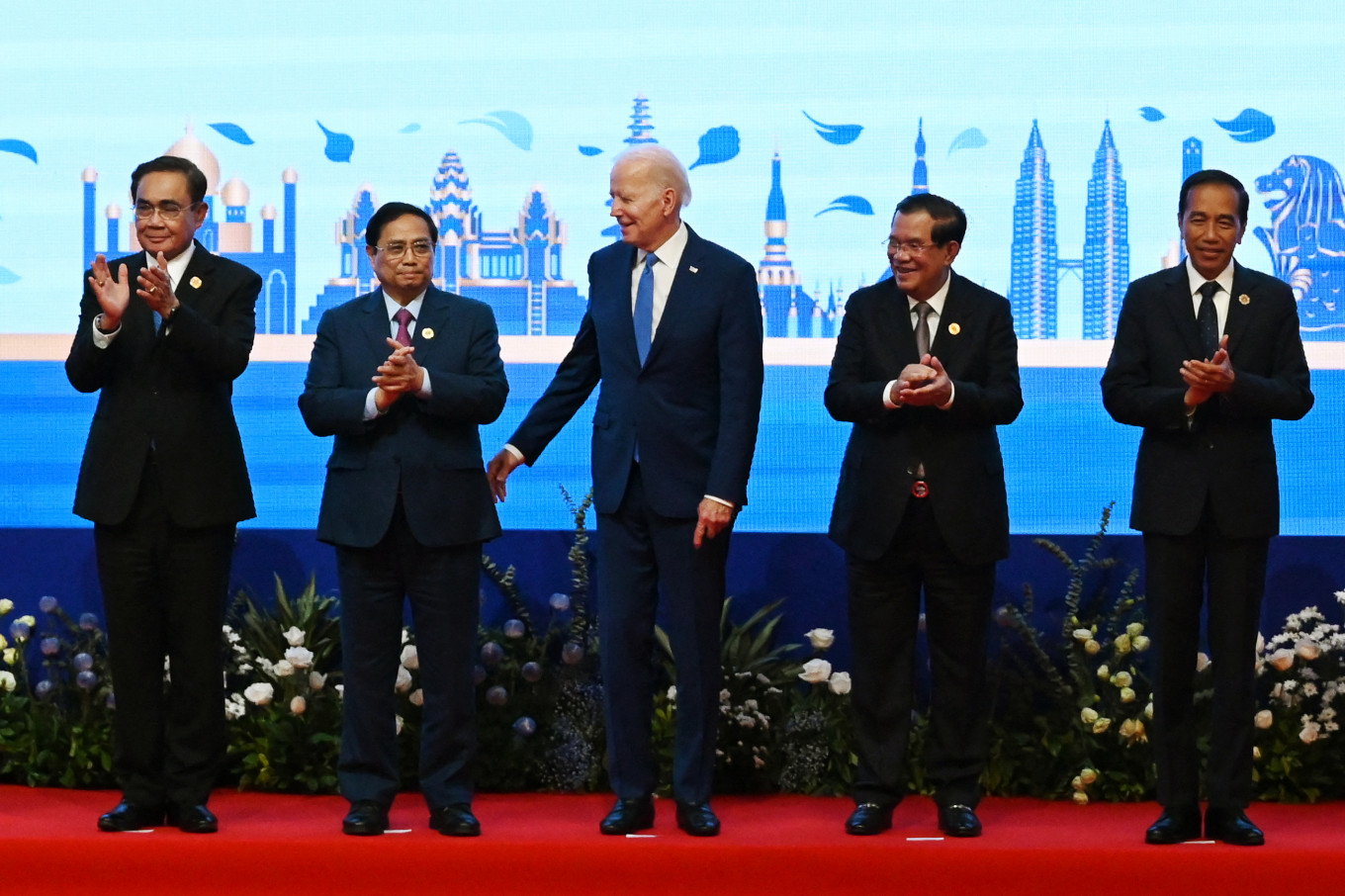Popular Reads
Top Results
Can't find what you're looking for?
View all search resultsPopular Reads
Top Results
Can't find what you're looking for?
View all search resultsTime to ramp up ASEAN’s Indo-Pacific strategy
ASEAN centrality is not simply a recognition of Southeast Asia’s geographical location straddling two oceans but also of the bloc's long list of diplomatic achievements in the region and the world.
Change text size
Gift Premium Articles
to Anyone
 (Left to right) Thailand’s Prayut Chan-O-Cha, Vietnamese Prime Minister Pham Minh Chinh, United States President Joe Biden, Cambodian Prime Minister Hun Sen and President Joko “Jokowi” Widodo pose for pictures during the ASEAN-US summit as part of the 40th and 41st ASEAN Summits in Phnom Penh on Nov. 12, 2022. (AFP/Tang Chhin Sothy)
(Left to right) Thailand’s Prayut Chan-O-Cha, Vietnamese Prime Minister Pham Minh Chinh, United States President Joe Biden, Cambodian Prime Minister Hun Sen and President Joko “Jokowi” Widodo pose for pictures during the ASEAN-US summit as part of the 40th and 41st ASEAN Summits in Phnom Penh on Nov. 12, 2022. (AFP/Tang Chhin Sothy)

The Indo-Pacific is becoming the most contested region in the world, particularly between the United States and China. It is not the Middle East or Europe, but it is here, in a vast land and maritime region flanked by two oceans, where tensions have been building as big and middle powers seek to protect their interests. The next great war could erupt here if countries behave recklessly.
Global security, and hence global prosperity, hinges on how these tensions play out in the coming years. Many countries have devised Indo-Pacific strategies, but since most are built in anticipation of possible conflict, the military buildup we have been seeing in the past few years has been fueling tensions.
One exception is the ASEAN Outlook on the Indo-Pacific Outlook (AOIP) which has been gaining wider recognition as a viable basis upon which to build a new regional architecture that can bring all these countries together to discuss peace and prosperity through cooperation and development.
ASEAN should build on this by ramping up its Indo-Pacific strategy. There is no better time for this, especially since Indonesia, whose initiative it was to develop the AOIP, is this year’s rotating chair of the group.
One criticism of AOIP when it was launched in 2019 was that it lacked readily implementable substance. Admittedly, the five-page document lays out a broad set of principles and objectives that require further elaboration to be considered a comprehensive strategy.
But this weakness may turn out to be the document’s strength, as countries find little to object to in such principles as openness, inclusivity, transparency, rules-based systems and governance. This is another display of the “ASEAN way” of relying on diplomacy – slow, but it gets you there. Bring everyone on board first and discuss the details later.
The US, Japan, India, Australia and the European Union, have expressed support for the ASEAN initiative even while pursuing their own Indo-Pacific strategies. China is reluctant to address the Indo-Pacific as a geopolitical entity, sticking to the outmoded Asia-Pacific, but President Xi Jinping, in meetings with ASEAN leaders, has said he saw possible alignments between the AOIP and his own Belt and Road Initiative.
Inclusivity distinguishes the ASEAN strategy as others have devised their Indo-Pacific strategy with countering the rise of China in mind.
And everyone accepts the central role that ASEAN plays in the region, a key element in the AOIP.
This centrality is not simply a recognition of Southeast Asia’s geographical location straddling two oceans but also of ASEAN’s long list of diplomatic achievements in the region and in the world. ASEAN hosts the annual East Asia Summit involving 18 countries, including the US, China and Russia. Its annual foreign ministers’ meeting also brings the big powers to the table, whether individually or together, including in the ASEAN Regional Forum. The Asia-Pacific Economic Cooperation forum, involving 21 countries, recognizes ASEAN centrality, with the group hosting the summit every other year.
Indonesia, as this year’s ASEAN chair, is ready to seize the opportunity, picking up on the leaders’ declaration in Phnom Penh in November that called for the prioritization of four aspects of the AOIP in all ASEAN activities: maritime cooperation, connectivity, the sustainable development goals, as well as economic and more general cooperation.
"Indonesia will continue to stress that the Indo-Pacific should not be seen through the security lens only, but also [through the lens of] inclusive economic development,” Foreign Minister Retno Marsudi said in a speech last week presenting Indonesia’s foreign policy priorities for the year, as quoted by CNN Indonesia.
If Indonesia can pull it off, the ASEAN Indo-Pacific strategy can salvage what is left of the much-hyped “Asian Century”, as the rising tensions between the US and China defuse the optimism about Asia leading the world seen at the start of the millennium.
President Joko “Jokowi” Widodo has a personal stake in seeing the AOIP implemented, as it is aligned with his own vision of Indonesia as a global maritime fulcrum in the Indo-Pacific region, with the plan to build Indonesia as a maritime power ready to play its part in promoting peace and stability.
Last year, Jokowi won international plaudits for successfully leading the Group of 20 through its most difficult time because of the war between Russia and Ukraine. The G20 summit in Bali was not only well attended, but it produced a joint declaration, against all odds given the division among members over the war.
This year, as ASEAN chair, Jokowi has another equally challenging task. He has to exercise leadership once again to help ensure peace and stability in the Indo-Pacific region and beyond.
***
The writer is a senior editor of The Jakarta Post.










